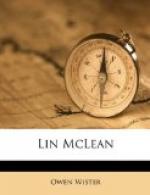“It shows, does it?” said Lin. “Well, it don’t usually. Not except when I’m—when I’m—”
“Down?” suggested his Excellency.
“Yes, Doc. Down,” the cow-puncher confessed.
Barker looked into his friend’s clear hazel eyes.
Beneath their dauntless sparkle was something that touched the Governor’s good heart. “I’ve got some whiskey along on the trip—Eastern whiskey,” said he. “Come over to my room awhile.”
“I used to sleep all night onced,” said McLean, as they went. “Then I come to know different. But I’d never have believed just mere thoughts could make yu’—make yu’ feel like the steam was only half on. I eat, yu’ know!” he stated, suddenly. “And I expect one or two in camp lately have not found my muscle lacking. Feel me, Doc.”
Barker dutifully obeyed, and praised the excellent sinews.
Across from the dance-hall the whining of the fiddle came, high and gay; feet blurred the talk of voices, and voices rose above the trampling of feet. Here and there some lurking form stumbled through the dark among the rubbish; and clearest sound of all, the light crack of billiard balls reached dry and far into the night Barker contemplated the stars and calm splendid dimness of the plain. “’Though every prospect pleases, and only man is vile,’” he quoted. “But don’t tell the Republican party I said so.”
“It’s awful true, though, Doc. I’m vile myself. Yu’ don’t know. Why, I didn’t know!”
And then they sat down to confidences and whiskey; for so long as the world goes round a man must talk to a man sometimes, and both must drink over it. The cow-puncher unburdened himself to the Governor; and the Governor filled up his friend’s glass with the Eastern whiskey, and nodded his spectacles, and listened, and advised, and said he should have done the same, and like the good Governor that he was, never remembered he was Governor at all with political friends here who had begged a word or two. He became just Dr. Barker again, the young hospital surgeon (the hospital that now stood a ruin), and Lin was again his patient——Lin, the sun-burnt free-lance of nineteen, reckless, engaging, disobedient, his leg broken and his heart light, with no Jessamine or conscience to rob his salt of its savor. While he now told his troubles, the quadrilles fiddled away careless as ever, and the crack of the billiard balls sounded as of old.
“Nobody has told you about this, I expect,” said the lover. He brought forth the little pistol, “Neighbor.” He did not hand it across to Barker, but walked over to Barker’s chair, and stood holding it for the doctor to see. When Barker reached for it to see better, since it was half hidden in the cow-puncher’s big hand, Lin yielded it to him, but still stood and soon drew it back. “I take it around,” he said, “and when one of those stories comes along, like there’s plenty of, that she wants to get rid of me, I just kind o’ take a look at ‘Neighbor’ when I’m off where it’s handy, and it busts the story right out of my mind. I have to tell you what a fool I am.”




